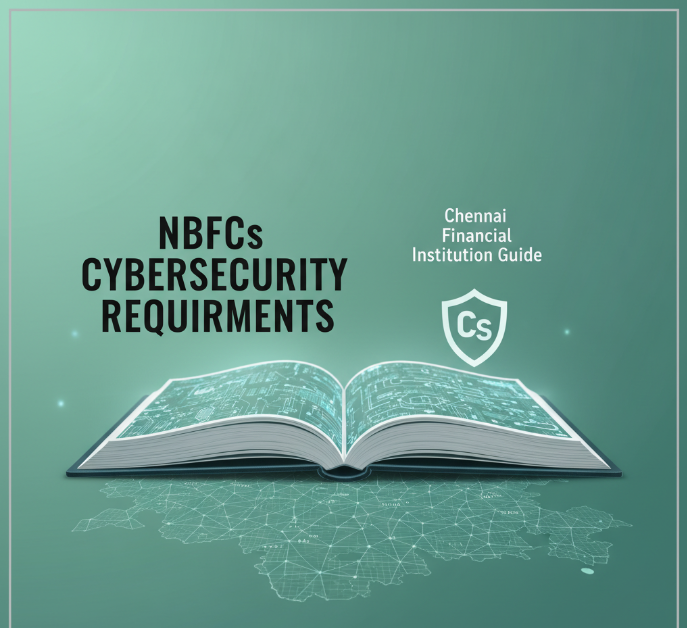NBFCs Cybersecurity Requirements: Chennai Financial Institution Guide

Introduction: Why NBFC Cybersecurity Needs Urgent Attention
NBFCs now rival banks in customer reach, digital transaction volume, and credit innovation. Yet, their high transaction complexity, legacy system integration, and expanding third-party relationships expose them to cyber risks ranging from ransomware to data theft. Recent regulatory updates make robust cybersecurity a necessity—not just a business advantage.
RBI Cybersecurity Framework: 2025 Mandates for NBFCs
The Reserve Bank of India’s 2025 directives set multi-layered standards for security and resilience:
- Cybersecurity Policy and Governance: NBFCs must have board-approved policies that cover risk management, data protection, digital fraud prevention, and a direct line between the Chief Information Security Officer (CISO) and the board.
- Security Operations Centers (SOC): Institutions are required to set up or partner with SOCs for real-time threat monitoring, incident detection, and coordinated response.
- Access Control: Deployment of multi-factor authentication, strict role-based access, and continuous privilege reviews for all sensitive systems and data.
- Data Encryption: RBI insists on strong encryption for data at rest and in transit—using protocols such as AES-256 where feasible.
- Incident Response: Detailed procedures for rapid breach containment, forensic investigation, and regulatory reporting; must tie in with Disaster Recovery (DR) and Business Continuity Planning (BCP).
- VAPT and Audits: Quarterly vulnerability assessments and penetration testing, performed by CERT-In empanelled auditors, to preempt emerging threats and regulatory lapses.
CERT-In Guidelines: National Standards for Incident Reporting and Security Controls
CERT-In is India’s central agency for digital incident response, mandating:
- Six-hour window for reporting significant cyber incidents via official channels.
- Mandatory multi-factor authentication (MFA) on critical systems and all high-volume transactions.
- Secure handling of customer and operational data—encrypting in transit and at rest.
- Patch management policies with strict timelines for vulnerability remediation.
Digital Lending and Fintech Partnerships: Chennai’s Unique Challenges
The RBI’s 2025 guidelines require NBFCs to:
- Conduct rigorous KYC, data privacy audits, and ensure compliance of fintech partners across digital lending channels.
- Periodically review all loan service provider contracts for consent, risk profile transparency, encryption, and regulatory reporting practices.
- Stay ahead of updates—recent fines for non-compliance underscore the risk of casual partnerships or outdated vendor diligence.
Vendor and Third-Party Risk Management
NBFCs must:
- Evaluate and audit every vendor for regulatory compliance, cybersecurity, and incident response capabilities.
- Include robust security clauses in contracts addressing data ownership, breach notification, and recovery.
- Perform regular, documented vendor risk assessments and maintain a clear inventory of service providers.
Employee Training and Security Culture
Strong cybersecurity requires human expertise and vigilance:
- Conduct regular employee workshops addressing phishing, malware, social engineering, and new threat vectors.
- Update board and leadership on the latest regulatory expectations, attack trends, and incident protocols.
- Simulate attacks and test response workflows to ensure practical preparedness.
Ongoing Compliance and Reporting
2025 guidelines call for precision in reporting and audit-readiness:
- NBS-1, NBS-2, ALM, and XBRL-based reports submitted on schedule.
- Internal and external IT audits, compliance gap analyses, governance reviews, and immediate regulatory notifications for major incidents.
- Ensure digital lending practices meet fairness, data handling, and customer consent requirements.
Technology Solutions for Chennai NBFCs
Adopting enterprise-grade solutions is now essential:
- SOC-as-a-Service, automated VAPT platforms, encrypted cloud storage, identity and access management suites, and backup with cyber resilience.
- Endpoint protection, advanced audit logging, and zero-trust architectures help NBFCs protect data and meet evolving threats.
Chennai Focus: Local Implementation and Trends
- Collaborate with regionally specialized CERT-In partners for timely audits and incident handling.
- NBFCs must tailor risk responses to the city’s tech talent pool, threat landscape, and evolving regulatory priorities.
- Local forums and industry bodies provide ongoing intelligence, training, and peer learning opportunities for NBFC security teams.
Enforcement & Penalties
Recent fines and naming of non-compliant institutions highlight:
- Steep financial penalties for lapses in digital lending, failed reporting, or weak cybersecurity.
- Reputation damage and regulatory scrutiny for repeated non-compliance, especially as RBI and CERT-In increase enforcement in Chennai.
Conclusion: Staying Ahead of the Curve
By integrating board-level governance, advanced technical controls, frequent audits, and a culture of vigilance, NBFCs in Chennai not only avoid fines but build resilience and customer confidence. The future demands proactive alignment with RBI and CERT-In mandates, technology-driven risk management, and continuous security evolution.
Take the Next Step with CodeSecure Solutions
Cyber threats are growing more sophisticated every day. With a trusted partner by your side, you can safeguard your business while focusing on what truly matters—growth and innovation.
At CodeSecure Solutions, we deliver comprehensive cybersecurity services in Chennai, uniquely tailored for startups, SMEs, and enterprises:
- Vulnerability Assessment & Penetration Testing (VAPT)
- Network Security Solutions
- Compliance Support (ISO 27001, PCI-DSS, HIPAA, DPDP Act, GDPR)
- Cloud & Endpoint Protection
- Security Awareness Training
No matter your industry or size, CodeSecure customizes solutions to fit your needs—ensuring your data, reputation, and operations remain secure.
Ready to Strengthen Your Defenses?
- 📞 Call: +91 73584 63582
- ✉️ Email: vapt@codesecure.in
- 🌐 Visit: www.codesecure.in
Stay secure. Stay informed. Choose CodeSecure Solutions—your partner in cyber resilience.
